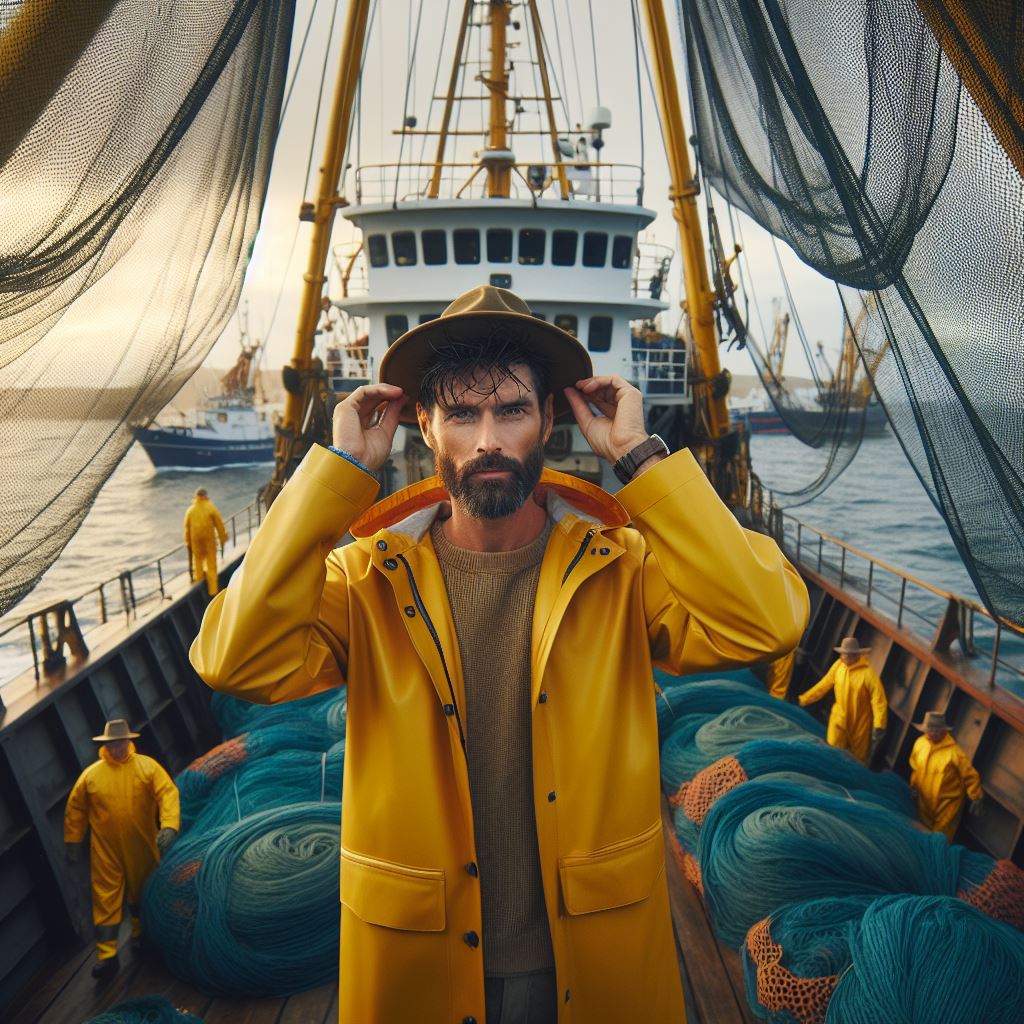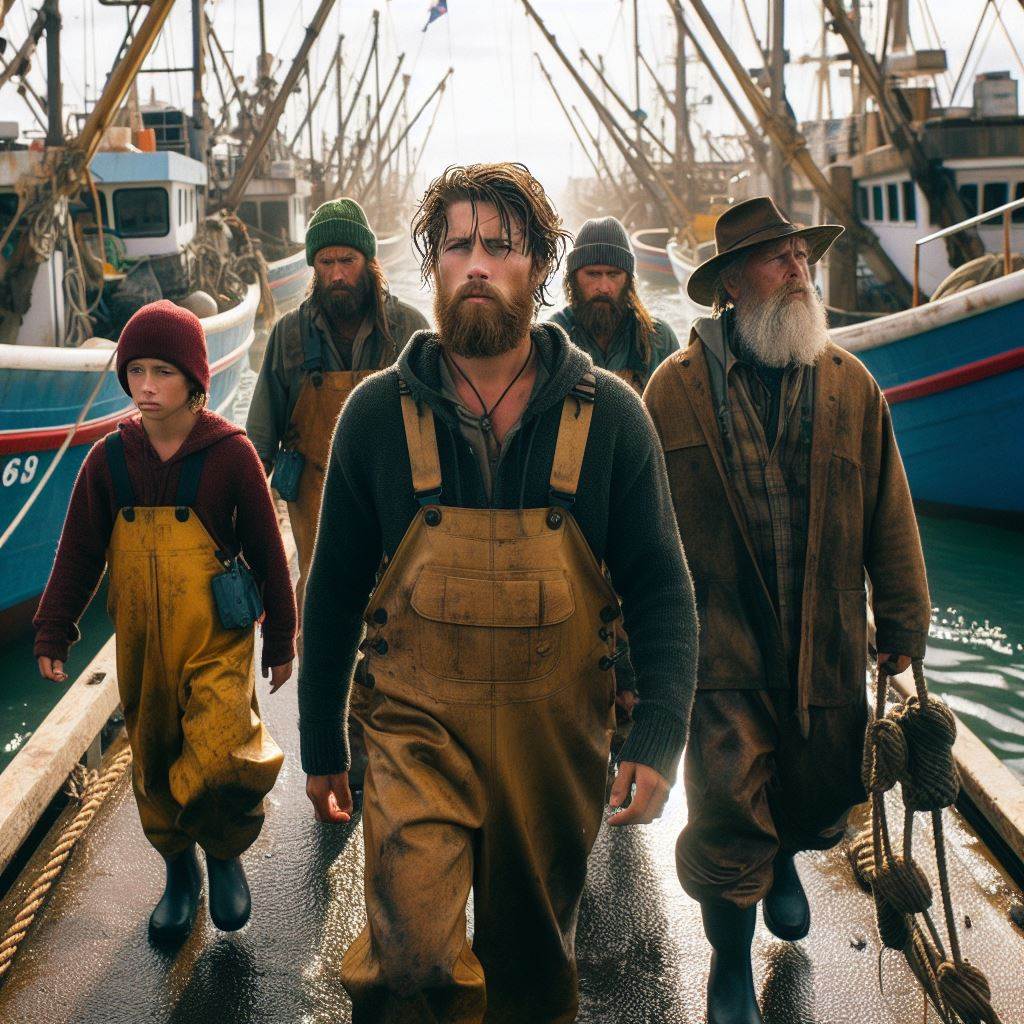Introduction
Have you ever considered becoming a fisherman in Australia?
This career path holds great relevance and importance for those who love the sea and seafood.
When it comes to choosing a career path, becoming a fisherman in Australia might not be the first option that comes to mind.
However, this profession holds great significance within the country’s economy and cultural heritage.
Australia is surrounded by vast oceans teeming with diverse marine life, making it a perfect destination for those passionate about fishing.
Being a fisherman in Australia means having the opportunity to explore the country’s stunning coastlines and experience the thrill of catching various species of fish.
Additionally, the demand for fresh seafood in Australia and globally presents a lucrative market for professional fishermen.
Not only do they contribute to the nation’s economy, but they also satisfy the appetites of seafood lovers.
Apart from the economic benefits, this career path also offers a unique lifestyle.
Fishermen spend their days out at sea, surrounded by nature’s beauty.
They develop a deep connection with the ocean and its inhabitants.
The solitude and tranquility found on a fishing boat can be a source of great satisfaction for those who crave a break from the fast-paced city life.
Furthermore, becoming a fisherman allows individuals to engage in sustainable practices.
Australian fishermen are highly regulated and adhere to strict guidelines to ensure the conservation of marine resources.
By choosing this career path, one can actively contribute to safeguarding the delicate balance of Australia’s marine ecosystems, thus securing a future for upcoming generations.
In summary, becoming a fisherman in Australia goes beyond a mere job; it is a lifestyle that offers opportunities to explore nature, contribute to the economy, and contribute to marine conservation efforts.
This career path provides individuals with a chance to make a living while indulging in their passion for the sea and seafood.
Overview of the Fishing Industry in Australia
Statistics and facts about the fishing industry in Australia
- Australia has one of the largest fishing zones in the world, spanning over 8 million square kilometers.
- The fishing industry in Australia contributes significantly to the country’s economy, generating billions of dollars annually.
- The industry provides employment opportunities for over 11,000 people, both directly and indirectly.
- According to recent statistics, Australia produces approximately 240,000 tons of seafood each year.
- The value of Australia’s seafood production exceeds AUD 2 billion, making it a vital sector for the nation.
Different types of fishing activities that exist in the country
- Commercial Fishing: Commercial fishing plays a substantial role in meeting the demand for seafood in Australia and internationally. Various methods such as trawling, netting, and long-lining are employed.
- Recreational Fishing: Australians have a strong affinity for recreational fishing, which is regarded as a popular leisure activity. It allows individuals to relax while enjoying the thrill of catching fish.
- Indigenous Fishing: Indigenous communities across Australia have relied on fishing as a traditional way of life for centuries. It holds cultural significance and contributes to their food sources and traditions.
- Aquaculture: Aquaculture refers to the farming of fish and seafood products. It has gained prominence in recent years due to increasing demand and declining wild fish stocks.
- Charter Fishing: Charter fishing services offer individuals the opportunity to experience fishing in various locations, guided by experienced fishermen. It is a unique and often thrilling adventure for tourists and locals alike.
Additionally, it is worth noting the magnificent marine diversity found in Australia’s waters, which contributes to the vibrancy of its fishing industry. The country is home to a vast array of fish species, including barramundi, snapper, tuna, and many others.
The fishing industry faces a variety of challenges and concerns, including overfishing, habitat destruction, climate change impacts, and sustainable resource management.
However, stringent regulations and sustainable practices have been implemented to ensure the industry’s long-term viability and protection of the marine ecosystem.
The Australian government actively supports the fishing industry, providing research and development grants, monitoring and regulating fishing activities, and promoting sustainable practices.
It aims to strike a balance between meeting the growing demand for seafood and preserving marine biodiversity.
In a nutshell, the fishing industry in Australia is a significant economic contributor and cultural activity. It encompasses various types of fishing activities, ranging from commercial to recreational and indigenous fishing.
The industry’s reliance on sustainable practices and effective management will be essential in securing its future success.
With its abundant marine resources and commitment to responsible fishing, Australia remains a haven for those considering a career as a fisherman.
Read: Forestry Economics: The Australian Scene
Requirements and Skills
Becoming a fisherman in Australia requires more than just a passion for the sea. It demands physical and mental resilience, as well as a specific set of skills and qualifications.
Working as a fisherman involves enduring long hours at sea, often under harsh weather conditions. It is essential for aspiring fishermen to possess both physical fitness and excellent swimming skills.
The job also requires mental strength to handle the unpredictable nature of the profession.
Physical and Mental Requirements
- Physical fitness is crucial as fishermen often engage in physically demanding tasks at sea.
- Excellent swimming skills are necessary as emergencies may arise, requiring quick response in water.
- Mental strength is essential to endure long hours of work under challenging conditions.
- Good communication skills are important for coordinating tasks with the crew and authorities.
- Ability to work well in a team is crucial as fishermen often work in close quarters for extended periods.
- Resilience to handle the unpredictable nature of the job is necessary.
Fishermen must have good communication skills to coordinate tasks with the crew and authorities. Collaboration and teamwork are crucial in a work environment where close quarters are the norm for extended periods.
Adaptability and problem-solving skills are necessary to navigate challenges that arise at sea. Understanding fish behavior, maritime regulations, and safety protocols is essential for successful and legal fishing.
Alongside these skills, proficiency in operating fishing equipment such as nets, lines, and traps is necessary. Fishermen must also be competent in utilizing navigation tools like GPS, compass, or celestial navigation to locate fishing grounds.
Basic knowledge of first aid and emergency response techniques is vital to ensuring the safety and well-being of the crew.
Necessary Skills and Qualifications
- Basic knowledge of fish behavior and habitats is advantageous for successful fishing.
- Familiarity with fishing equipment such as nets, lines, and traps is necessary.
- Ability to navigate using GPS, compass, or celestial navigation is important for locating fishing grounds.
- Understanding of maritime regulations, weather patterns, and safety protocols is required.
- Basic knowledge of first aid and emergency response techniques is essential.
- Experience in boat handling and maintenance is beneficial.
- Problem-solving skills and adaptability are crucial for dealing with unexpected situations at sea.
Obtaining certain certifications and licenses is often necessary to legally pursue a career as a fisherman. Depending on the fishing area and type of fishing, a valid driver’s license may be required.
A boat operator’s license or certification might also be necessary for operating a fishing vessel. Certificates in Marine Radio and First Aid can enhance job prospects and safety at sea.
Certifications and Licenses
- Depending on the fishing area and type of fishing, a valid driver’s license may be required.
- A boat operator’s license or certification may be necessary for operating a fishing vessel.
- Certificates in Marine Radio and First Aid can enhance job prospects and safety at sea.
- Depending on the fishing area, a Commercial Fishing License may be required to legally fish.
- Obtaining and maintaining appropriate licenses, permits, and endorsements are essential.
- Additional certifications or qualifications in fish handling and processing can be advantageous.
- Regular renewals and adherence to safety protocols are essential for continued legality in the profession.
In some regions, a Commercial Fishing License is mandatory to legally engage in fishing activities. Additionally, obtaining additional certifications or qualifications in fish handling and processing can further boost employment opportunities.
Fishermen must ensure regular renewal of licenses, permits, and endorsements while strictly adhering to safety protocols to remain legally compliant throughout their careers.
To embark on a successful career as a fisherman in Australia, aspiring individuals must be prepared to meet the physical and mental demands of the job.
They should possess the necessary skills, qualifications, and certifications to ensure their safety, as well as legality in pursuing their fishing profession.
Read: Forester Safety: Tips and Practices
Educational Pathway
In order to become a fisherman in Australia, there are several potential educational options or courses that can help aspiring individuals gain the necessary skills and knowledge.
Potential educational options
- Marine Studies: Many universities and vocational institutions offer marine studies programs that cover various aspects of the fishing industry, including marine biology, fisheries management, and aquaculture.
- Fishing and Aquaculture: Specific courses focused on fishing and aquaculture provide practical training in skills such as boat handling, navigation, fish farming, and seafood processing.
- Maritime Operations: Maritime operations programs provide comprehensive training in maritime safety, navigation, seamanship, environmental responsibilities, and fisheries legislation.
- Marine Engineering: For individuals interested in the technical aspects of fishing vessels, a marine engineering course can provide knowledge about maintenance, repair, and operation of fishing boat engines and equipment.
- Maritime Business or Management: For those aspiring to start their own fishing business or move into managerial roles within the industry, studying maritime business or management can be beneficial. These courses cover topics like business planning, marketing, and financial management.
Specialized training programs available in Australia
- Master Fisherman Program: This specialized program, offered by the Australian Maritime College, provides advanced training for professional fishermen. It covers advanced fishing techniques, sustainability practices, and vessel management.
- Coxswain Certificate: The Coxswain Certificate is a mandatory requirement for individuals operating a commercial fishing vessel. This certificate can be obtained through a training program that includes both theoretical and practical components.
- Marine Radio Operator’s Certificate: A marine radio operator’s certificate is essential for fishermen to communicate effectively and safely at sea. Programs that provide training and assessment for this certification are available in Australia.
- First Aid Certification: Obtaining a first aid certification is highly recommended for fishermen. There are various first aid training programs available that teach essential lifesaving skills and emergency response techniques.
- Boat and Personal Watercraft Licensing: Fishermen must possess the appropriate boat and personal watercraft licenses, depending on the size and type of vessel they operate. Training programs and exams are conducted to obtain these licenses.
Overall, pursuing relevant educational options or courses and completing specialized training programs can greatly enhance an individual’s chances of becoming a successful fisherman in Australia.
Your Personalized Career Strategy
Unlock your potential with tailored career consulting. Get clear, actionable steps designed for your success. Start now!
Get StartedRead: Sustainable Forestry: Australian Strategies

Steps to Become a Fisherman in Australia
The Process of Entering the Fishing Industry
- Research the fishing industry to gain a comprehensive understanding of the field.
- Identify the type of fishing you are interested in, such as commercial fishing, recreational fishing, or aquaculture.
- Obtain the necessary licenses and permits required to legally fish in Australia.
- Contact local fishing associations or organizations to network and gain industry insights.
- Attend fishing industry seminars, workshops, and trade shows to expand your knowledge.
Detailing the Various Entry-Level Positions Available for Beginners
- Deckhand: Assist with daily operations, including setting up and repairing nets, and general maintenance tasks.
- Crabber: Catch crabs using traps or pots, and handle equipment such as bait and buoys.
- Trawler Crew: Work on large commercial fishing vessels, operating equipment and processing caught fish.
- Aquaculture Workers: Cultivate and harvest fish in controlled aquatic environments like fish farms.
- Charter Boat Crew: Provide fishing experiences for tourists, ensuring a safe and enjoyable trip.
Apprenticeship and Training Programs for Aspiring Fishermen
- Enroll in a Certificate II or III in Fishing Operations to gain foundational knowledge and skills.
- Consider joining an apprenticeship program to receive hands-on training under experienced fishermen.
- Some states in Australia offer specific training programs through TAFE institutes or industry bodies.
- During apprenticeship, learn essential skills such as navigation, boat maintenance, and fish handling.
- Gain practical experience by actively participating in fishing trips and engaging with industry professionals.
After Completing the Steps
All the hard work and dedication put into entering the fishing industry will pay off as you gradually progress in your career.
As you gain experience, you can explore advanced positions such as fishing boat captain, fishery manager, or even starting your own fishing business.
Continuous learning and staying updated with industry trends will help you thrive in this ever-evolving field. Remember, becoming a successful fisherman requires passion, resilience, and a deep love for the ocean and its fascinating creatures.
Good luck on your journey to becoming a skilled fisherman in Australia!
Read: Forestry and Wildlife: A Delicate Balance
Challenges and Advantages of the Career
The physical demands and risks involved in this profession
- Being a fisherman requires enduring long hours and harsh weather conditions.
- The physical demands include heavy lifting, repetitive motions, and standing for extended periods.
- Fishermen are exposed to various risks such as slippery decks, equipment malfunctions, and injuries from fish handling.
- Dangerous situations like storms, rough seas, or getting tangled in fishing nets can occur.
- The nature of fishing work also leads to fatigue, exhaustion, and mental stress.
Potential benefits and rewards of being a fisherman
- Fishing can be financially rewarding when there is a good catch or during peak seasons.
- The thrill of the job and the satisfaction of providing fresh seafood to communities can be rewarding.
- Fishermen have the opportunity to work in beautiful natural environments and enjoy the serenity of the sea.
- This profession allows individuals to sharpen their fishing skills and knowledge of marine life.
- Becoming a fisherman offers a sense of independence and freedom from traditional office jobs.
Mention the lifestyle and job security aspects of the career
- The fishing lifestyle often involves irregular schedules and being away from home for extended periods.
- Fishermen may have limited social life due to the demands of their work.
- The job security of a fisherman can vary based on factors like environmental regulations and fish stocks.
- Some fishermen may face uncertainties in income due to fluctuations in fish prices and market demand.
- However, government regulations and quotas help protect fish populations and ensure sustainable fishing practices.
In fact, a career as a fisherman in Australia comes with its own set of challenges and advantages.
The physical demands and risks of the profession cannot be underestimated.
Enduring long hours, harsh weather conditions, and potential danger is essential.
However, there are potential benefits and rewards to consider.
The financial rewards can be significant during peak seasons and when there is a good catch.
Moreover, the satisfaction of providing fresh seafood to communities and the opportunity to work in beautiful natural environments are rewarding aspects.
The fishing lifestyle may have its drawbacks, such as irregular schedules and limited social life.
Job security can be influenced by environmental regulations and fish stocks, causing income uncertainties.
Yet, government regulations and quotas aim to ensure sustainable fishing practices to protect fish populations.
It’s important to weigh both the challenges and advantages before embarking on a career as a fisherman in Australia.
Career Progression and Opportunities
Potential for Growth and Advancement in the Fishing Industry
- The fishing industry in Australia offers immense opportunities for career growth and advancement.
- With the increasing demand for seafood, the industry is constantly evolving and expanding.
- As a fisherman, there is potential to climb the ladder and take on higher-level roles.
- Experience and skills gained over time can lead to promotions and increased responsibilities.
- Advancement opportunities are not limited to just being a fisherman; various roles are available.
- Training programs and certifications can enhance skills and open doors for further advancement.
- By staying updated with industry trends and regulations, one can adapt and progress in their career.
- As the fishing industry becomes more sustainable, new avenues for growth are being explored.
- Opportunities exist for individuals with management skills to oversee fishing operations and teams.
- Entrepreneurial individuals can also start their own fishing businesses and create employment opportunities.
Career Paths and Specialties within the Fishing Field
- Besides being a fisherman, there are several other career paths and specialties within the fishing industry.
- Marine biologist: Studying marine life, ecosystem management, and conservation initiatives.
- Aquaculture specialist: Focusing on the cultivation and farming of aquatic organisms.
- Fishery officer: Enforcing fishing regulations, monitoring catch quotas, and preventing illegal activities.
- Research scientist: Conducting studies to improve fishing practices, sustainability, and resource management.
- Fisheries manager: Overseeing fishing operations, ensuring compliance with regulations, and optimizing productivity.
- Seafood distributor: Managing the distribution and marketing of seafood to different markets.
- Fishing gear designer: Developing innovative equipment and techniques for sustainable fishing.
- Seafood chef: Creating culinary delights with fresh seafood and bringing it to customers’ tables.
- Fishmonger: Selling and preparing seafood in fish markets or retail establishments.
Within each career path, professionals can specialize further and become experts in their respective fields.
Specializations can include marine ecology, aquaponics, fish stock assessment, seafood processing, and more.
To pursue different career paths within the fishing industry, individuals may require additional education and training.
Universities, vocational institutions, and industry organizations offer courses and programs tailored to specific roles.
Networking with professionals in the industry, attending conferences, and gaining hands-on experience are also beneficial.
Ultimately, the fishing industry provides a wide range of career options and growth possibilities for individuals passionate about the sea, marine life, and sustainable practices.
By constantly developing skills, staying updated, and exploring various career paths, one can uncover a rewarding and fulfilling journey in the fishing industry.
Support Organizations and Associations
Information about industry associations and organizations that support fishermen
- National Fisheries Association of Australia (NFAA) is a leading industry association representing fishermen.
- They offer support and advocacy for fishermen, ensuring their voices are heard in policy decisions.
- NFAA provides resources and information on regulatory requirements, fishing techniques, and market trends.
- Membership in NFAA connects fishermen with a network of industry professionals for knowledge sharing and support.
Resources or networks available to assist individuals in this career path
- The Australian Fisheries Management Authority (AFMA) regulates and manages fishing activities in Australia.
- AFMA provides information on licensing, quota management, sustainable fishing practices, and compliance.
- The Fishermen’s Support Network (FSN) offers counseling and mental health support services for fishermen.
- FSN assists fishermen in dealing with the physical and emotional challenges inherent in the profession.
- The Fishing Industry Research and Education Council (FIREC) conducts research to improve fishing techniques and sustainability.
- FIREC offers educational programs and workshops for fishermen to enhance their skills and knowledge.
Various local and regional associations that support fishermen
In addition to these organizations, there are various local and regional associations that support fishermen:
- The Western Australian Fishing Industry Council (WAFIC) represents commercial fishermen in Western Australia.
- WAFIC provides assistance in resolving industry-related issues and promotes sustainable fishing practices.
- The Queensland Seafood Industry Association (QSIA) supports Queensland’s commercial fishing sector.
- QSIA advocates for the industry, facilitates networking, and provides training opportunities for fishermen.
- The South Australian Fishermen’s Federation (SAFF) represents and supports professional fishermen in South Australia.
- SAFF works to protect the rights and interests of fishermen while promoting environmentally responsible practices.
These organizations and associations play a crucial role in supporting and empowering individuals in their career path as fishermen.
By providing resources, information, and a network of support, they contribute to the success and sustainability of the fishing industry in Australia.
Stand Out with a Resume That Gets Results
Your career is worth more than a generic template. Let us craft a resume and cover letter that showcase your unique strengths and help you secure that dream job.
Get HiredWhether it’s advocating for fishermen’s rights, conducting research to improve practices, or offering counseling services, these organizations make a positive impact on the lives of fishermen.
Aspiring fishermen can benefit greatly from engaging with these associations and utilizing the resources and networks they offer.
By staying informed, connected, and supported, individuals can navigate the challenges and seize the opportunities that come with a career in fishing.
Success Stories
Inspiring Stories and Interviews from Experienced Fishermen in Australia
- John Smith, a seasoned fisherman with over 20 years of experience, shares his inspiring journey.
- Smith emphasizes the importance of hard work, dedication, and adapting to unpredictable weather conditions.
- Sarah Richards, a successful female fisherman, breaks stereotypes and proves that gender is not a barrier in this career.
- Richards encourages aspiring fishermen to follow their passion and never give up despite societal expectations.
- Mark Anderson, an indigenous fisherman, shares his deep connection with the ocean and the cultural significance of fishing for his community.
- Anderson’s story highlights the importance of preserving traditional fishing methods and passing on knowledge to future generations.
- Interviews with experienced fishermen reveal the vast opportunities available in Australia’s fishing industry.
- They share stories of catching rare and exotic fish, exploring remote coastal regions, and the thrill of the hunt.
- Fishermen discuss the lifestyle and freedom that comes with being out at sea, away from the pressures of city life.
- They acknowledge the challenges, such as long working hours and physical demands, but emphasize the rewards outweigh them.
Testimonials and Anecdotes: The Rewards of Pursuing a Career in Fishing
- “Ever since I became a fisherman, I have experienced a sense of fulfillment that no other job could provide.” – David Turner
- “I started as a novice, but with determination and guidance, I now run my own successful fishing business.” – Samantha Jackson
- “Fishing not only feeds my family but also enables me to create unforgettable memories on the water.” – Robert Harris
- “I have had the opportunity to witness breathtaking sunrises and sunsets, making each day unique and beautiful.” – James Anderson
- “The feeling of reeling in a big catch and knowing that it will provide sustenance for many brings immense satisfaction.” – Emily Clarke
These testimonials from accomplished fishermen highlight the rewards of pursuing a career in fishing.
They exemplify the sense of purpose, independence, and connection with nature that can be achieved.
Fishermen express their gratitude for the bountiful resources provided by Australian waters.
Some share stories of personal growth, overcoming challenges, and the pride they feel in contributing to the nation’s seafood industry.
Aspiring fishermen are encouraged to embrace this fulfilling career path and seize the opportunities it offers in abundance.
In essence, the success stories and testimonials from experienced fishermen in Australia serve as inspiring examples for those interested in embarking on a career in fishing.
These stories highlight the rewards of hard work, dedication, and passion in this dynamic and fulfilling profession.
From breaking stereotypes to preserving cultural traditions, fishermen share unique perspectives and reasons why this career choice is incredibly rewarding.
The anecdotes and testimonials emphasize the deep satisfaction, sense of purpose, and connection with nature that can be attained as a fisherman in Australia.
So, if you have a love for the sea, a passion for fishing, and a desire for an exciting and fulfilling career, consider becoming a fisherman in Australia.
The success stories are waiting to be written.
Conclusion
A fisherman’s career in Australia offers both challenges and opportunities for those who are passionate about the fishing industry.
Throughout this blog post, we have discussed several key points that shed light on what it takes to become a fisherman in Australia.
Firstly, we explored the viability of this career path, highlighting the abundant marine resources and the growing demand for seafood in the country.
The fishing industry not only provides job security but also holds potential for economic growth.
However, we also emphasized the challenges that aspiring fishermen may face.
Working in harsh environmental conditions, navigating through regulations, and the physical demands of the job require determination, resilience, and specialized skills.
In general, becoming a fisherman in Australia can be a fulfilling career choice for those who love the ocean and enjoy the thrill of the hunt.
The fishing industry offers opportunities for growth and economic stability.
However, it is important for aspiring fishermen to approach this career path with realistic expectations.
If you have a true passion for fishing and are willing to put in the effort, becoming a fisherman in Australia can be a rewarding and exciting journey.
So, take the plunge, explore this career path, and immerse yourself in the world of fishing with a realistic understanding of the challenges and rewards it offers.




